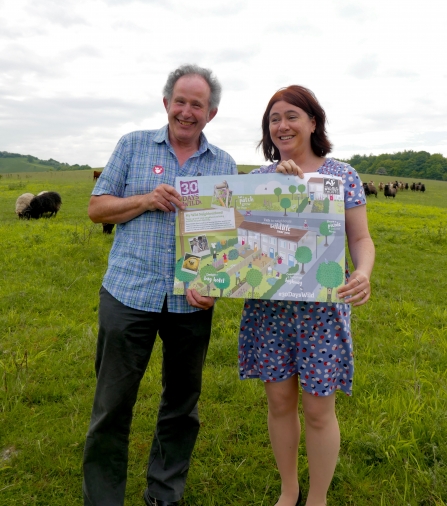At Pegsdon Hills in Bedfordshire a skylark sang overhead - perhaps intentionally heralding the 25th International Day of Biological Diversity to an audience of rare breed Red Poll cattle (with two month old calves), Manx Loaghtan and Hebridean sheep, the Trust's Director of Conservation John Comont, East of England MEP Alex Mayer, Trust grazier Matt Johnson, sheep dog Lass and long term volunteer warden Ken Winder.
Today, 22 May, marks the 25th anniversary of the United Nations Convention on Biological Diversity, and MEP Alex Mayer was keen to visit Pegsdon for the first time and learn about the conservation methods used. Rare breed livestock graze this rare chalk grassland habitat, keeping it at ideal length and preventing scrub growth developing. These breeds are hardy and traverse steep terrain with ease, and their diligent munching ensures that chalk wildflowers including pasqueflower, moschatel, horseshoe vetch, yellow-wort, milkwort, rockrose and varieties of orchid can flourish.
As the Trust's Director of Conservation John Comont says: "Pegsdon Hills’ steep chalk slopes, in the Chilterns Area of Outstanding Natural Beauty, offer some of the best views in the county. Conservation grazing is an invaluable part of the Wildlife Trust's work; sheep and cattle reach inaccessible areas helping maintain meadow and grassland for ground nesting birds such as skylark and lapwing, and for the regeneration of rare wildflowers vital for butterflies, bees and other pollinators."
Alex Mayer says: "I'm delighted to learn more about the invaluable work of the Wildlife Trust and to visit Pegsdon Hills to mark the International Day of Biological Diversity - and very pleased to help share the Trust's 30 Days Wild campaign in the run up to June. Listen to birds singing, accessorise with flowers or explore a fantastic local place like Pegsdon Hills - there are so many ways you can go Go Wild this summer. This is a fantastic initiative from the Wildlife Trust and I’d urge everyone to get involved.”
Volunteer warden Ken Winder has been involved at Pegsdon for the last 25 years - and remembers the site as a working field with bare chalk, before being restored to its now rare chalk grassland. As part of his ongoing work as a warden, Ken was there to carry out a butterfly transect and check early orchid growth.

